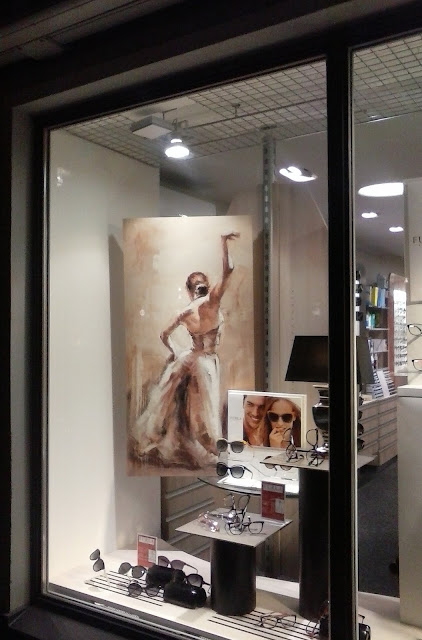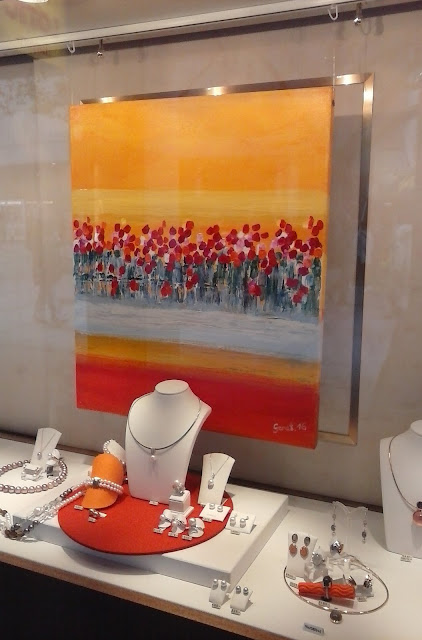Ich
habe den Artikel von Heather Chaplin vom 5. November in der Online-Ausgabe der New
York Times gelesen und mir dazu ein paar Gedanken über die Erlabnisorientierung des Shoppings gemacht.(http://www.nytimes.com/2016/11/11/style/online-shopping-stores-real-life.html?rref=collection%2Fsectioncollection%2Ffashion&_r=0)
Heather
Chaplin schreibt diesbezüglich, dass es für sie als kleines Mädchen das
Highlight des Jahres war einen Ausflug in Geschäfte zu machen und obwohl sie
sich nicht genau erinnert, was sie gekauft hat, erinnert sie sich an die Erfahrung
selbst. Infolgedessen erörtert sie, dass das Riechen von Parfums, das
Anprobieren von Taschen oder das Ansehen von glänzendem Schmuck das Wesentliche
am Shopping ist und nicht der Kaufakt an sich.
In
meiner Wahrnehmung ist auch das Fantasieren darüber Teil des Shoppings. Ich stelle
mir, dass ich eine Frau bin, die dies und jenes kaufen kann oder sich selbst in
der Umkleide inszenieren. Kurz gefasst, das Spiel!
Kann
man beim Shopping die Probleme des Alltags vergessen und dem Alltag selbst
entfliehen? Das ist eine merkwürdige Frage...
"When my friend’s sister died, I took her shopping for
something to wear at the service; when I got pregnant, she took me shopping for
maternity clothes. These afternoons of intimacy and friendship will be with me
long after the clothes have become stained, threadbare and unwearable." schreibt
Heather
Chaplin.
Mir
scheint es so, als ob Shopping auf seine eigene Art und Weise eine Zeremonie
ist. Der Witz ist (oder doch nicht), dass sich eine
ganze Industrie aus dieser Selbstbefreiung durch Shopping entwickelt hat. Und in jedem Land findet man eine
andere Preispolitik. Man kann es beispielsweise ohne größere Anstrengungen auf
den Etiketten von Inditex Kleidung feststellen. Warum ist demnach der Preis in
Deutschland höher als in Spanien?
Es muss in diesem Kontext auch das Online-Shopping angesprochen werden, bei
welchem man völlig isoliert von anderen Menschen ist, als eine neue Form des
Shoppings ohne sozialen Verkehr. Der neueste Trend aus New York ist
trunkclub.com, eine Internetseite, auf der man Boxen mit komplett fertigen Looks
bestellen kann oder gratis Stylisten engagieren, welche die eigene Garderobe
neu gestalten. Ist das das neue Gesicht der heutigen Frau? Wenn ja, dann
profitiert auch die Modeindustrie ebenfalls davon.
Heather
Chaplin schließt ihren Artikel mit dem Statement ab, dass, wenn man sich von der
Notwendigkeit befreit, alles besitzen zu wollen, was einem gefällt, kann man
Stores als einen Spielplatz betrachten. Und genau das wollte ich hier
ansprechen, dass wenn man mit Selbstkontrolle und Bewusstsein einkauft, so
befreit man sich von vielen Sachen.
Bewusst kaufen - gibt es überhaupt so etwas? Kompensatorische Ökonomie ist
die Basis für die heutige Modeindustrie. Was einem fehlt, versucht man mit
Produkten und Shopping auszufüllen.
Man
geht auch ins Museum, nicht um etwas zu kaufen oder zu besitzen. So etwas
bieten auch die neuen Boutiquen und Shops, es geht um das Erlebnis.
---------------------------------------------------------------------
I read the article of Heather Chaplin of 5 November in the online
edition of the New York Times, and I have made a few thoughts about the
experience orientation of shopping these days.
Heather
Chaplin writes that for her as a little girl the highlight of the year
was to go shopping and although she does not exactly remember what she
bought, she remembers the experience itself.
In my perception is also the fantasizing about it part of the shopping. I imagine that I am a woman who can buy this and that, or to stage oneself in the changing room. In short, the game!
Can you forget the problems of everyday life while you are shopping and escape everyday life? This is a strange question.
Shopping seems to me also as ceremony in its own way. The joke is (or not) that a whole industry benefits from this self-liberation through shopping. And in each country you find a different sales policy. For example, it can be determined without much effort on the labels of Inditex clothing. Why is the price in Germany higher than in Spain?
In
this context, it is also necessary to address online shopping where one
is completely isolated from other people as a new form of shopping
without social traffic. The
latest trend from New York is trunkclub.com, a website where you can
order boxes with completely finished looks or order for free stylists, who
redesign your wardrobe. Is this the new face of today's woman?
If so, the fashion industry also benefits from it.Heather
Chaplin concludes her article with the statement that if you are free
from the need to own everything you like, you can perceive stores as a
playground. And that is exactly what I wanted to address here, that if you buy
with self-control and consciousness, you are free from many things. Buying consciously - is there any such thing at all?
Compensatory economics is the basis for today's fashion industry. What is missing, one tries to fill with products and shopping. One also goes to the museum, not to buy or own something. This is what the new boutiques offer, too. Experience.



